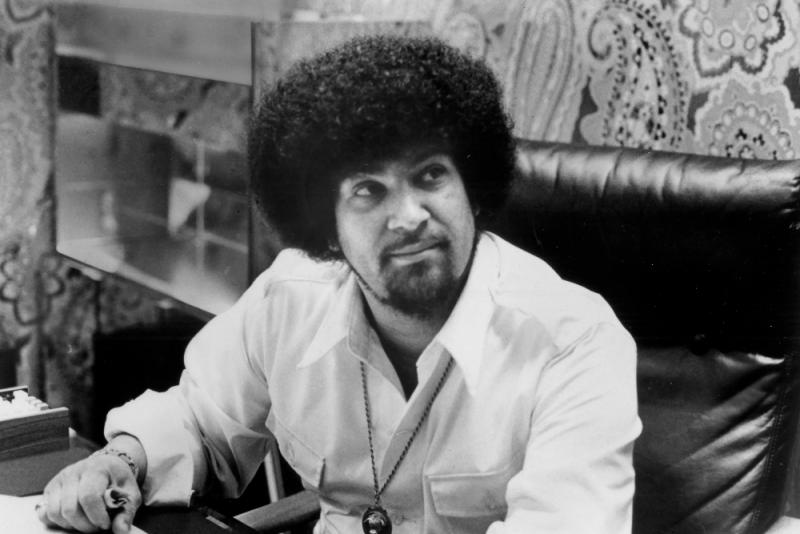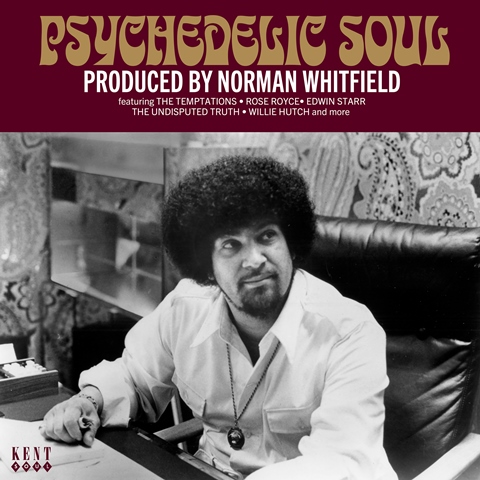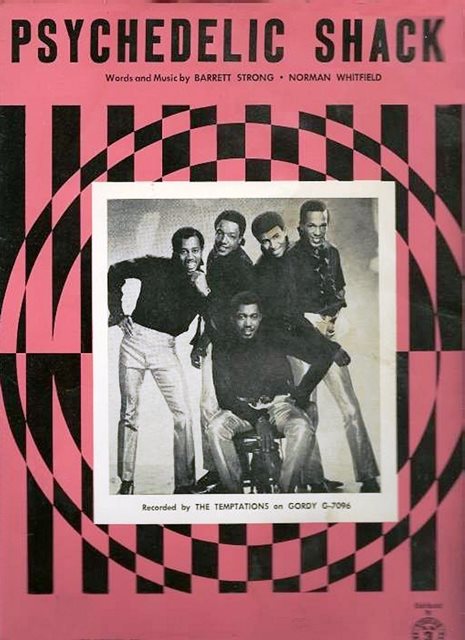Reissue CDs Weekly: Psychedelic Soul - Produced By Norman Whitfield | reviews, news & interviews
Reissue CDs Weekly: Psychedelic Soul - Produced By Norman Whitfield
Reissue CDs Weekly: Psychedelic Soul - Produced By Norman Whitfield
First-ever overview of the storied producer and songwriter

While there’s undoubtedly some of “Papa Was a Rollin' Stone” in Rare Earth’s “Come With me”, another correspondence also immediately springs to mind – the Melody Nelson-era Serge Gainsbourg. And maybe, due to the female moaning, the “Je T’Aime”-period Gainsbourg too.
“Come With me” is the final cut on the 18-track compilation Psychedelic Soul - Produced By Norman Whitfield, the first-ever dig into the work of the titular producer and songwriter. It shouldn’t be confused with a 2003 Temptations’ comp, also titled Psychedelic Soul.
 Whitfield began working for Motown in 1963 and stayed there until the mid-Seventies, after which he ran his own label Whitfield Records. During those 10-plus years at the Detroit hit factory he worked with – amongst others – Marvin Gaye, The Miracles and The Temptations. Bob Stanley, this comp’s compiler, pinpoints Gaye’s “I Heard it Through the Grapevine” as the opening shot of the producer’s dive into psychedelic soul.
Whitfield began working for Motown in 1963 and stayed there until the mid-Seventies, after which he ran his own label Whitfield Records. During those 10-plus years at the Detroit hit factory he worked with – amongst others – Marvin Gaye, The Miracles and The Temptations. Bob Stanley, this comp’s compiler, pinpoints Gaye’s “I Heard it Through the Grapevine” as the opening shot of the producer’s dive into psychedelic soul.
Psychedelic Soul opens with “I Heard it Through the Grapevine”. Not a record which can be dulled by familiarity, it’s “brooding, all dark crimson and indigos” as Stanley puts it. A studio creation, it stretched-out what could be done with the song and the performer. Although recorded in February 1967, Motown wasn’t keen so it was belatedly issued as a single in October 1968 (other Motown acts had issued the song though – Gaye's version was the problem: a precursor to the label's issues with his What's Going On album). Whitfield, it seemed, was ahead of his time. “I Heard it Through the Grapevine” was a monster hit.
Times move on, Motown got with the programme and The Temptations’ “Psychedelic Shack” was released at the end of December 1969. A blatant case of trend hopping, it's got that title, wah-wah guitar and spacey noises. “You can really do your thing in the psychedelic shack. There’s a thousand coloured lights.” In the booklet, Whitfield is quoted saying he was influenced by Sly Stone, the guiding light coursing through “Psychedelic Shack” and its October 1968 predecessor Temp’s single “Cloud Nine” (not collected on Psychedelic Soul).
 Whitfield was obviously pushing forward faster and was more open than the Motown machine of which he was part. Alongside “I Heard it Through the Grapevine”, the other earliest track on Psychedelic Soul is Gladys Knight & The Pips’ version of “The Look Of Love”, from the Whitfield-produced 1968 album Silk N' Soul. It’s passionately atmospheric, intense and not-so far from where Barry White was heading.
Whitfield was obviously pushing forward faster and was more open than the Motown machine of which he was part. Alongside “I Heard it Through the Grapevine”, the other earliest track on Psychedelic Soul is Gladys Knight & The Pips’ version of “The Look Of Love”, from the Whitfield-produced 1968 album Silk N' Soul. It’s passionately atmospheric, intense and not-so far from where Barry White was heading.
The collection's latest tracks date to 1977, 1978, 1979 and even 1981. Stargard’s “Just One Love”, from their 1981 Back 2 Back album, is Psychedelic Soul’s penultimate track. It’s fantastic, but a very strange listen as the woozy atmosphere and cycling strings could have cropped up on a record from 1970 or 1972 rather than about 10 years later. Equally disorienting is Spyder Turner’s “I've Been Waitin'”. From 1978, it sounds like a 1972 Marvin Gaye single.
This fascinating compilation homes in on what hasn’t been so specifically identified before: that Norman Whitfield was a very particular sonic auteur who was as concerned with atmosphere as the song itself. Whether the results as heard here where psychedelic per se, that’s moot. Nonetheless, they were about an elevated consciousness and unnatural moods. Whitfield died in 2008 so it’s not possible to know what he would have made of this interpretation of his career. He's quoted, though, as saying he wanted to “serve up something people weren’t expecting.” And that’s what’s done by the thought-provoking Psychedelic Soul - Produced By Norman Whitfield.
- Next week: British psychedelia double header with Fire’s Father's Name Is Dad and The Syn’s - Rare Blooms From The Syn
- More reissue reviews on theartsdesk
- Kieron Tyler’s website
Explore topics
Share this article
The future of Arts Journalism
You can stop theartsdesk.com closing!
We urgently need financing to survive. Our fundraising drive has thus far raised £49,000 but we need to reach £100,000 or we will be forced to close. Please contribute here: https://gofund.me/c3f6033d
And if you can forward this information to anyone who might assist, we’d be grateful.

Subscribe to theartsdesk.com
Thank you for continuing to read our work on theartsdesk.com. For unlimited access to every article in its entirety, including our archive of more than 15,000 pieces, we're asking for £5 per month or £40 per year. We feel it's a very good deal, and hope you do too.
To take a subscription now simply click here.
And if you're looking for that extra gift for a friend or family member, why not treat them to a theartsdesk.com gift subscription?
more New music
 Pop Will Eat Itself's 'Delete Everything' is noisy but patchy
Despite unlovely production, the Eighties/Nineties unit retain rowdy ebullience
Pop Will Eat Itself's 'Delete Everything' is noisy but patchy
Despite unlovely production, the Eighties/Nineties unit retain rowdy ebullience
 Music Reissues Weekly: The Earlies - These Were The Earlies
Lancashire and Texas unite to fashion a 2004 landmark of modern psychedelia
Music Reissues Weekly: The Earlies - These Were The Earlies
Lancashire and Texas unite to fashion a 2004 landmark of modern psychedelia
 Odd times and clunking lines in 'The Life of a Showgirl' for Taylor Swift
A record this weird should be more interesting, surely
Odd times and clunking lines in 'The Life of a Showgirl' for Taylor Swift
A record this weird should be more interesting, surely
 Waylon Jennings' 'Songbird' raises this country great from the grave
The first of a trove of posthumous recordings from the 1970s and early 1980s
Waylon Jennings' 'Songbird' raises this country great from the grave
The first of a trove of posthumous recordings from the 1970s and early 1980s
 Lady Gaga, The Mayhem Ball, O2 review - epic, eye-boggling and full of spirit
One of the year's most anticipated tours lives up to the hype
Lady Gaga, The Mayhem Ball, O2 review - epic, eye-boggling and full of spirit
One of the year's most anticipated tours lives up to the hype
 Slovenian avant-folk outfit Širom’s 'In the Wind of Night, Hard-Fallen Incantations Whisper' opens the door to inner space
Unconventional folk-based music which sounds like nothing else
Slovenian avant-folk outfit Širom’s 'In the Wind of Night, Hard-Fallen Incantations Whisper' opens the door to inner space
Unconventional folk-based music which sounds like nothing else
 'The Art of Loving': Olivia Dean's vulnerable and intimate second album
Neo soul Londoner's new release outgrows her debut
'The Art of Loving': Olivia Dean's vulnerable and intimate second album
Neo soul Londoner's new release outgrows her debut
 Music Reissues Weekly: The Peanut Butter Conspiracy - The Most Up Till Now
Definitive box-set celebration of the Sixties California hippie-pop band
Music Reissues Weekly: The Peanut Butter Conspiracy - The Most Up Till Now
Definitive box-set celebration of the Sixties California hippie-pop band
 Doja Cat's 'Vie' starts well but soon tails off
While it contains a few goodies, much of the US star's latest album lacks oomph
Doja Cat's 'Vie' starts well but soon tails off
While it contains a few goodies, much of the US star's latest album lacks oomph
 Mariah Carey is still 'Here for It All' after an eight-year break
Schmaltz aplenty but also stunning musicianship from the enduring diva
Mariah Carey is still 'Here for It All' after an eight-year break
Schmaltz aplenty but also stunning musicianship from the enduring diva
 Album: Solar Eyes - Live Freaky! Die Freaky!
Psychedelic indie dance music with a twinkle in its eye
Album: Solar Eyes - Live Freaky! Die Freaky!
Psychedelic indie dance music with a twinkle in its eye

Add comment